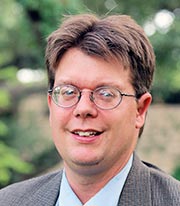
As the acting dean of academic affairs for the fall semester, I was given the task of preaching at our Matriculation service. As is customary for this service, the readings were taken from the propers for education found on page 931 of the Book of Common Prayer. My attention turned to the reading from Deuteronomy 6 and the instruction to Israelites on how to teach their children about God’s saving deeds done for them.
In the midst of writing this sermon, I began to wonder what Jewish scholars in the past had said about this passage. If you know me, this is not surprising because one of my areas of research and great passions is Jewish-Christian relations. And so it came that the center of my sermon came from the commentary by the great medieval Jewish scholar Rabbi Shlomo ben Yitzhak of Troyes, popularly known by the acronym Rashi (taken from the first letter of his title and name R-Sh-Y).
So why was it that offering the thoughts of Rashi to a Christian community seemed helpful and useful? Certainly part of it is the sense that a venerable Jewish interpretation of a core passage from the Scriptures can be useful and insightful. But alongside that, is a conviction that learning from traditions different from our own is vital. By and large, Christianity has developed interpretations of the Hebrew Scriptures that have not included insights from millennia of Jewish scholarship and insights. Some of this is due to the shameful history of Christian anti-Judaism and supersessionism. But some of it comes from the fact that many Christian interpreters of the Bible in our own age simply don’t know of the riches to be found.
And so, I took a step forward and chose to introduce Rashi to our seminary community. It was not a particularly risky step. But it was a move that invited us all to stop and listen to a voice not found in our own tradition. And yet Rashi’s voice, in turns out, did not sound out of place in the context of our voices and conversations we have at Seminary of the Southwest. Perhaps he was even teaching us a little part about the harmony created when different voices are brought together.
Question: Can you remember a time when you gained an important insight from a perspective or tradition different from your own?

The Rev. Joslyn-Siemiatkoski is the Duncalf-Villavaso Professor of Church History and Acting Academic Dean. He joined the seminary faculty in 2014 following his tenure since 2005 on the faculty at Church Divinity School of the Pacific in Berkeley, California. Dan’s areas of interest include Anglican and Episcopal history, Jewish-Christian relations ancient and modern, Anglican ecclesiology, and contemporary interfaith dialogue. He is the author of Christian Memories of the Maccabean Martyrs and is currently working on A Christian Commentary of Mishnah Avot. He has published in journals such as Anglican Theological Review and Anglican and Episcopal History. He teaches History of Christianity I and II, The Episcopal Church: Past and Present, English Reformations, and other electives in his areas of expertise. Professor Joslyn-Siemiatkoski was ordained in June, 2017, in the Diocese of California. Dan and his wife Jennifer have two children.
BA, Gordon College
MA and PhD, Boston College

